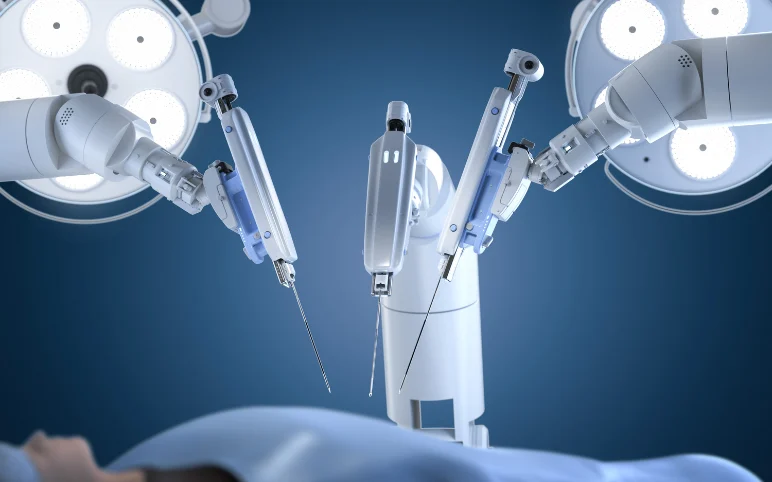Medtronic Secured CE Mark for LigaSure™ Technology Integration on Hugo™ Robotic-Assisted Surgery System, Paving the Way for the Future of Surgery
On July 15, 2025, Medtronic plc, a global leader in healthcare technology, announced that it received CE Mark approval for its LigaSure™ RAS vessel-sealing technology. This approval enhances the capabilities of the Hugo™ robotic-assisted surgery (RAS) system for use in gynecologic, general, and urologic procedures across Europe.
Marking a significant advancement, the LigaSure™ RAS instrument is the first vessel-sealing device designed specifically for robotic platforms. It ushers in a new chapter for the LigaSure™ technology, which has been used in over 35 million procedures across more than 65 countries over the past 20 years.
“Today, with CE Mark for LigaSure™ RAS, Medtronic is fulfilling a promise to customers to integrate our trusted vessel-sealing technology onto the Hugo™ RAS system,” said Matt Anderson, senior vice president and president of the Surgical business, which is part of the Medical Surgical Portfolio at Medtronic. “More than fulfilling a commitment, this regulatory approval is a big step forward as we continue to shape the future of surgery with surgical teams who share our passion and commitment to deliver the best possible care to every patient.”
“LigaSure™ technology is one of the most important advances for minimally invasive surgery because it provides sealing and cutting in a way that is very, very secure for the performance of the surgeon and the security of the patient,” said Dr. Caceres. “As a robotic surgeon, we want LigaSure™ technology because it gives us confidence in the security of the seal. We are already seeing the benefits in our cases with the Hugo™ RAS system.”
Exclusively compatible with the Hugo™ RAS system and powered by the Valleylab™ FT10 energy platform, the LigaSure™ RAS Maryland instrument is designed to seal and cut vessels, lymphatics, and thick tissue up to 7 mm in diameter. It delivers consistent vessel sealing in roughly two seconds while reducing thermal spread to surrounding tissues.
As per DelveInsight’s “Surgical Robotic System Market Report”, the surgical robotic systems market was valued at USD 11,082.32 million in 2024, growing at a CAGR of 13.21% during the forecast period from 2025 to 2032 to reach USD 29,785.13 million by 2032. The rising incidence of chronic disorders such as cancer, cardiovascular diseases, and orthopedic conditions is significantly boosting the demand for advanced surgical interventions, thereby propelling the growth of the surgical robotic systems market. As chronic conditions often require complex, high-precision surgeries, robotic-assisted procedures offer enhanced accuracy, minimal invasiveness, and quicker recovery times, making them highly suitable for treating such ailments. Simultaneously, the increasing number of surgical procedures globally, driven by a growing aging population and a higher prevalence of lifestyle-related health issues, is further escalating the need for efficient and precise surgical tools. In response, key market players are heavily investing in product development activities, focusing on innovations such as compact robotic platforms, AI integration, and enhanced visualization systems. These advancements not only expand the scope of robotic surgery across specialties but also improve surgical outcomes, thereby contributing to the growth of the surgical robotic systems market during the forecast period from 2025 to 2032.
FDA Approved Updated Irrigation Rate for Johnson and Johnson’s VARIPULSE™ Platform
On July 14, 2025, Johnson & Johnson MedTech, a global leader in the treatment of cardiac arrhythmias, received approval from the U.S. Food and Drug Administration (FDA) for an update to the irrigation flow rate of its VARIPULSE™ Platform. This approval underscores the company’s ongoing commitment to advancing pulsed field ablation (PFA) technology in line with real-world clinical practices.
This regulatory milestone comes as Johnson & Johnson MedTech surpasses 10,000 VARIPULSE™ procedures performed across the United States, Europe, Canada, Japan, Hong Kong, China, South Korea, Taiwan, and Australia. Impressively, the platform maintained a neurovascular adverse event rate of under 0.5%.
The VARIPULSE™ Platform is Johnson & Johnson MedTech’s proprietary pulsed field ablation (PFA) system. It comprises the VARIPULSE™ Catheter, the TRUPULSE™ Generator, and the CARTO™ 3 Mapping System equipped with VARIPULSE™ software. The platform is now approved for clinical use in the United States, Europe, Asia Pacific, and Canada.
“By learning from real-world experience and working closely with clinicians, we are continuously enhancing our technologies to improve patient care,” said Michael Bodner, Company Group Chair, Electrophysiology & Neurovascular, Johnson & Johnson MedTech. “This update to the VARIPULSE™ Platform reflects our ongoing commitment to lead the evolution of PFA through meaningful, data-driven improvements that advance product performance and build procedural confidence.”
As per DelveInsight’s “Radiofrequency Ablation Devices Market Report”, the radiofrequency ablation devices market was valued at USD 3.64 billion in 2023, growing at a CAGR of 9.37% during the forecast period from 2024 to 2030 to reach USD 6.19 billion by 2030. The demand for radiofrequency ablation devices is witnessing growth due to the growing prevalence of chronic diseases such as cardiovascular diseases, cancers, a rising geriatric population, and technological advancements in product development and design improvement.
Aethlon Medical, Inc. Reported Favorable Data Safety Monitoring Board Review and Received Recommendation to Proceed to the Next Clinical Trial Cohort
On July 15, 2025, Aethlon Medical, Inc., a clinical-stage biotechnology company focused on developing its investigational Hemopurifier®, an extracorporeal therapeutic device for oncology and other indications, announced that the independent Data Safety Monitoring Board (DSMB) overseeing its ongoing clinical trial completed its scheduled safety assessment. Following this review, the DSMB recommended proceeding to the next patient cohort without any protocol modifications.
The ongoing study, titled “Safety, Feasibility, and Dose-Finding Study of Aethlon Hemopurifier in Patients with Solid Tumors Who Stable or Progressive Disease While on a Treatment That Includes Pembrolizumab or Nivolumab,” is designed to evaluate the safety, feasibility, and optimal dosing of the Hemopurifier in a specific patient population.
The DSMB, comprising independent experts in nephrology and oncology, reviewed data from the initial cohort of three patients, each of whom underwent a single 4-hour Hemopurifier session. Their evaluation identified no safety concerns, reaffirming the device’s favorable safety and tolerability profile. Notably, no serious adverse events (SAEs) or dose-limiting toxicities (DLTs) related to the Hemopurifier have been observed to date.
With Cohort 1 completed, enrollment is now open for Cohort 2. Participants in this next phase will receive two Hemopurifier treatments over one week across the study’s three active clinical sites in Australia. The trial aims to enroll between 9 and 18 patients in total. It focuses on evaluating the device’s safety and dosing feasibility in patients with solid tumors who have either stable or progressive disease while receiving checkpoint inhibitors, Pembrolizumab (Keytruda®) or Nivolumab (Opdivo®).
The trial’s primary endpoint is the incidence of adverse events and any clinically significant changes in laboratory safety parameters in patients treated with the Hemopurifier. Secondary objectives include evaluating the number of treatments required to reduce levels of tumor-derived extracellular vesicles (EVs) and whether this reduction enhances the immune system’s natural ability to combat tumor cells. These insights will help shape the design of a future pivotal efficacy and safety study required for Premarket Approval (PMA) by regulatory authorities.
Aethlon Medical remains committed to advancing the Hemopurifier for oncology applications and will continue to share progress updates as the trial moves forward.
The Hemopurifier is an investigational, extracorporeal medical device designed to remove both enveloped viruses and tumor-derived extracellular vesicles (EVs) from a patient’s bloodstream. It functions in conjunction with a blood pump and utilizes plasma separation, size exclusion, and affinity binding through a plant-based lectin resin that targets mannose-rich glycoproteins commonly found on EVs and viruses.
The device was granted Breakthrough Device Designation by the U.S. Food and Drug Administration (FDA) for two key indications. Treatment of patients with advanced or metastatic cancer who are unresponsive or intolerant to standard-of-care therapies and treatment of life-threatening viral infections not addressed by currently approved therapies. The Hemopurifier is currently under development under an open Investigational Device Exemption (IDE) for both oncology and antiviral indications.
“The DSMB’s positive recommendation is encouraging and underscores the favorable safety profile observed to date in patients with cancer,” according to Steven LaRosa, M.D, Chief Medical Officer of Aethlon Medical. “This marks a significant step forward in the clinical development program for the Hemopurifier in Oncology and brings the company closer to potentially addressing the significant unmet medical need for the approximately 60-70% of patients with cancer who do not experience a lasting clinical response to anti-PD-1 immunotherapy.”
Solid tumor-derived EVs are believed to contribute to cancer progression, metastasis, and resistance to both immunotherapy and chemotherapy. The Hemopurifier’s ability to selectively remove these vesicles has been demonstrated in both in vitro studies and human clinical settings.
According to DelveInsight’s “Cancer Therapy Market Report”, the cancer therapy market was valued at USD 169.39 billion in 2023, growing at a CAGR of 9.12% during the forecast period from 2024 to 2030, to reach USD 285.96 billion by 2030. The cancer therapy market is witnessing a positive market growth owing to factors such as the rising prevalence of various cancers, which are contributing to the growing demand for cancer treatment, and the presence of factors like an increasing aging population, wherein age plays a key role in cancer development in certain cancer types, namely breast cancer. Moreover, the growing focus on developing targeted therapies due to advancements in precision medicine to provide a more pronounced therapeutic effect is further driving the cancer therapy market, as new products are gaining regulatory approvals for cancer treatment. Collectively, these factors are expected to collectively propel the growth of the cancer therapy market worldwide during the forecast period from 2024 to 2030.
MicroPort® CardioFlow’s VitaFlow Liberty® Achieved Successful First Commercial Implantations in South Korea
On July 14, 2025, MicroPort® CardioFlow announced the successful completion of the first commercial implantations of its VitaFlow Liberty® Transcatheter Aortic Valve Implantation (TAVI) system in South Korea. Five procedures were carried out at two prominent cardiovascular centers: Seoul St. Mary’s Hospital (The Catholic University of Korea) and Chonnam National University Hospital.
The implantations were overseen by Professor Junjie Zhang, Vice President of Nanjing First Hospital, and conducted by Dr. Chang Ki Yuk at Seoul St. Mary’s Hospital and Dr. Kim Juhan at Chonnam National University Hospital. Postoperative evaluations indicated positive outcomes, with no significant paravalvular leakage or procedural complications, even in a 90-year-old patient suffering from severe aortic stenosis. Both the proctor and attending physicians expressed strong confidence in the system’s clinical performance.
VitaFlow Liberty® is an evolution of the original VitaFlow® system, featuring a hybrid-density self-expanding stent, bovine pericardial leaflets, and a dual-layer PET skirt designed to enhance radial strength, enable precise coaxial deployment, and reduce perivalvular leakage. Additionally, its next-generation delivery system integrates an innovative double-reinforced spiral structure that facilitates fast, stable, and accurate valve deployment and retrieval, along with 360-degree bending capability for improved navigation.
“Under Professor Zhang’s guidance, VitaFlow Liberty® demonstrated excellent performance and stable deployment.” Said Dr. Chang Ki Yuk.
Dr. Kim Juhan added, “The system’s precision and stability gave us strong confidence in treating complex cases.”
The introduction of VitaFlow Liberty® in South Korea represents a key advancement in MicroPort® CardioFlow’s international growth. The company remains dedicated to pioneering structural heart innovations and delivering exceptional cardiovascular care to patients around the globe.
According to DelveInsight’s “Transcatheter Aortic Valve Replacement/Implantation Market Report”, the transcatheter aortic valve devices market was valued at USD 3.23 billion in 2023, growing at a CAGR of 15.41% during the forecast period from 2024 to 2030 to reach USD 7.64 billion by 2030. The demand for transcatheter aortic valve replacement devices is primarily being boosted by the increasing prevalence of aortic stenosis disorder, rise in cardiovascular disorders, increasing demand for TAVR procedures, increasing prevalence of aortic regurgitation and the technological advancements about the transcatheter aortic valve replacement arena which are expected to increase in the product demand thereby contributing in the growth of the transcatheter aortic valve replacement devices market during the forecast period from 2024 to 2030.
Olympus Introduced EU-ME3 Ultrasound Processor to U.S. Market for Enhanced GI and Pulmonary Disease Detection
On July 16, 2025, Olympus Corporation, a global leader in medical technology dedicated to enhancing health, safety, and quality of life, announced the U.S. launch of its next-generation EU-ME3 Ultrasound Processor. This advanced system integrates both endoscopic and endobronchial ultrasound (EUS/EBUS) capabilities into a single, compact workstation, delivering imaging performance on par with high-end ultrasound centers.
Designed to support both diagnostic imaging and ultrasound-guided interventions, the EU-ME3 is ideal for hepatobiliary, pancreatic, and pulmonary procedures. With its high-resolution imaging, advanced functionality, and user-friendly design, the EU-ME3 pushes the boundaries of endosonography.
To aid in the detection and characterization of lesions, the processor delivers superior image quality for clear visualization during EUS and EBUS procedures. Incorporating technologies like s-FOCUS and Tissue Harmonic Echo, it enhances resolution, improves signal-to-noise ratio, reduces artifacts, and ensures consistent focus across the entire depth of the field.
“As healthcare facilities look for ways to improve patient outcomes and save costs, we are pleased to offer our customers a versatile, state-of-the-art ultrasound platform for GI and pulmonary applications,” said Richard Reynolds, President of the Medical Systems Group at Olympus Corporation of the Americas. “The EU-ME3 allows physicians to realize clinical efficacy through premier imaging that supports early detection and diagnosis for patients.”
Smart configuration settings enable healthcare providers to tailor the system to individual physician preferences and procedural needs. The EU-ME3 also offers forward and backward compatibility with Olympus® EUS and EBUS endoscopes as well as miniature probes. This adaptability enhances cost-efficiency for healthcare facilities by streamlining resources across multiple specialties.
According to DelveInsight’s “Ultrasound Devices Market Report,” the ultrasound devices market was valued at USD 6.76 billion in 2023, growing at a CAGR of 6.82% during the forecast period from 2024 to 2030 to reach USD 10.05 billion by 2030. The ultrasound devices market is witnessing positive growth owing to the rising incidence of severe chronic diseases such as cardiovascular, urology, and others, further rapid technological developmental activities, growing awareness for early disease detection, and increasing geriatric population across the globe who are more susceptible to developing chronic disorders, and rising adoption owing to no radiation exposure, thereby contributing to the growth of the ultrasound devices market during the forecast period from 2024 to 2030.
QuidelOrtho and BÜHLMANN Laboratories AG Announced the Launch of the fCAL® and fPELA® Turbo Assays on VITROS™ Systems as a MicroTip Partnership Assay (MPA)
On July 14, 2025, QuidelOrtho Corporation and BÜHLMANN Laboratories AG jointly announced the launch of the BÜHLMANN fCAL turbo and fPELA turbo assays on QuidelOrtho’s VITROS Systems as a MicroTip Partnership Assay (MPA). These particle-enhanced turbidimetric immunoassays offer advanced diagnostic capabilities: the fCAL turbo assay supports the detection of fecal calprotectin, aiding in the diagnosis of inflammatory bowel disease (IBD) and its distinction from irritable bowel syndrome (IBS), while the fPELA turbo assay measures fecal pancreatic elastase, assisting in the identification of pancreatic insufficiency.
This strategic collaboration aligns with key healthcare trends, including the shift toward non-invasive diagnostics, the pursuit of cost-effective solutions, and the increased attention on gastrointestinal and pancreatic health and their broader systemic implications. The fCAL and fPELA turbo assays demonstrate cutting-edge innovation in diagnostics, contributing to the movement toward personalized medicine and preventive healthcare.
“The integration of BÜHLMANN’s fCAL and fPELA turbo assays with our VITROS Systems represents a significant advancement in IBD and pancreatic insufficiency diagnoses,” said Jonathan Siegrist, PhD, Executive Vice President of Research & Development & Chief Technology Officer at QuidelOrtho. “This collaboration allows laboratories to provide fast results to aid in the diagnosis and management of IBD and pancreatic issues. With features like the long calibration interval and the ability to use the CALEX Cap–prepared stool samples directly, we’re offering a solution that combines clinical accuracy with operational efficiency, ultimately improving patient care.”
“We are thrilled to collaborate with QuidelOrtho to expand the delivery of an efficient, automated solution for fecal biomarker testing,” said Christian Eberle, Chief Executive Officer at BÜHLMANN Laboratories AG. “Our assays, combined with the CALEX Cap stool preparation device, optimize stool extraction efficiency to help maximize stability and yield, resulting in robust fecal calprotectin and pancreatic elastase test results. This collaboration between QuidelOrtho and BÜHLMANN Laboratories AG meets evolving patient and provider needs in the era of personalized medicine and preventive healthcare, offering innovative solutions that align with the industry’s focus on non-invasive, cost-effective, and patient-centric diagnostic tools.”
Both assays are now available for use on QuidelOrtho’s VITROS Systems, including the VITROS XT 7600 and 5600 Integrated Systems, and the VITROS 4600 Chemistry System in both the U.S. and international markets. Key features of the assays include results delivered in under 10 minutes, broad reportable measurement ranges, 90-day on-analyzer reagent stability, seamless integration with VITROS Automation Solutions, and streamlined sample extraction and preparation via CALEX® Cap technology.
According to DelveInsight’s “Immunoassay Market Report,” the Immunoassay market is poised for significant growth, projected to achieve a remarkable CAGR of 7.53% during the forecast period from 2024 to 2030. The demand for immunoassays is primarily being boosted by the increasing prevalence of chronic disorders such as cancers and lifestyle disorders such as diabetes mellitus, among others. The increase in various oncological disorders, such as breast cancer and prostate cancer, is a key factor influencing the positive growth of the market. Further, the rising awareness among people regarding early disease diagnosis is also contributing to the overall growth of the immunoassay market during the forecast period from 2024 to 2030.



